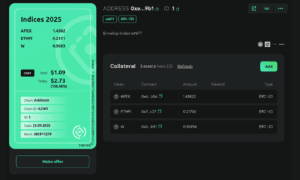Welcome to the world of non-fungible tokens (NFTs), where digital assets are turning heads and making waves in the art, music, and gaming industries. But what about domain names? Can they also find a place in this captivating realm? Today, we’re here to demystify NFTs and explore whether you can sell a domain name as an NFT.
Introduction
Domain names are an essential part of the internet, serving as the unique identifier for websites and online services. They act as a digital address, allowing users to access specific websites by typing in a URL or clicking on a link. In recent years, there has been a significant buzz around non-fungible tokens (NFTs), with many people wondering if it is possible to sell domain names as NFTs. To understand this concept fully, we must first delve into the basics of domain names and how they work.
A domain name consists of two parts: the top-level domain (TLD) and the second-level domain (SLD). The TLD is located at the end of a website’s address and usually indicates its purpose or country code (.com,.org,.gov,.uk). On the other hand, SLD refers to the specific name chosen by website owners to represent their brand or business within that TLD.
For example, in “www.example.com,” “.com” is the TLD, while “example” is the SLD. It is essential to choose a memorable and relevant SLD because it plays an integral role in helping users find your website online.
So, what exactly are NFTs? Non-fungible tokens are unique digital assets built on blockchain technology that verifies ownership and authenticity. Unlike fungible assets like cryptocurrencies, which can be exchanged for identical units without any difference in value, each NFT is one-of-a-kind and cannot be replicated or replaced.
The Intersection of NFTs and Domain Names
The world of non-fungible tokens (NFTs) has been taking the digital world by storm, with record-breaking sales and increasing interest from both creators and buyers. NFTs are unique digital assets that can represent anything from art pieces to tweets to virtual real estate. But one question that has been circulating in the domain name industry is whether a domain name can also be sold as an NFT.
At first glance, it may seem like a natural fit—both domain names and NFTs are digital assets with unique values. However, there are some key differences between the two that make their intersection more complex than it may seem.
Firstly, let’s understand what exactly a domain name is. A domain name is essentially your website’s address on the internet—for example, www.example.com. It acts as an online identifier for individuals or businesses and is crucial for establishing their online presence. Domain names are registered through accredited registrars and are subject to annual renewal fees.
Can you sell a domain name as an NFT?
In recent years, there has been a rise in the popularity of non-fungible tokens (NFTs) as a form of digital asset. NFTs are unique digital assets that are verified on a blockchain network, making them one-of-a-kind and irreplaceable. This has led to the creation of NFT art, music, videos, and even tweets being sold for millions of dollars.
As the world becomes more familiar with NFTs, questions have arisen about what can and cannot be sold as an NFT. One common question is whether or not domain names can be sold as NFTs. In this section, we will demystify the concept of selling domain names as NFTs.
Firstly, it’s important to understand what a domain name is and how it differs from an NFT. A domain name is simply the address used to access a website on the internet. It consists of letters, numbers, and hyphens that make up a unique URL for each website. On the other hand, an NFT is a digital asset that represents ownership of something unique on a blockchain network.
Factors to Consider Before Selling Your Domain Name as an NFT
When considering selling your domain name as an NFT, there are several important factors to take into account. Though the concept of selling digital assets is relatively new and can seem daunting, it is important to carefully consider all aspects before making a decision. In this section, we will explore the key factors you should consider before selling your domain name as an NFT.
1. Intellectual Property Rights: Before proceeding with the sale of your domain name as an NFT, it is crucial to ensure that you have full ownership and rights over the name. This means checking for any trademarks or copyrights associated with the name and making sure that you are not infringing on anyone else’s intellectual property. If there are any issues in this regard, it could lead to legal complications down the line.
2. Market Demand: Like any other asset, the value of your domain name as an NFT will depend on market demand. It is important to research and understand if there is a demand for your specific domain name within the NFT market. Factors such as relevance, uniqueness, and potential future use can all impact its value in this space.
3. Platform Selection: There are several platforms available for selling NFTs, each with its own set of rules and fees. Before choosing a platform for your domain name sale, it is crucial to do thorough research and understand their terms and conditions. Some platforms may also have restrictions on what types of assets can be sold as NFTs.
4. Pricing Strategy: Determining the right price for your domain name as an NFT can be challenging. It is important to research similar sales and their prices within the NFT market to get an idea of its potential value. You can also consult with experts in the field or use online valuation tools to help determine a fair price.
5. Potential Use Cases: It is important to consider the potential use cases for your domain name as an NFT. Will it have value beyond just being a digital asset? Could it potentially be used in virtual worlds or other digital projects? Considering these possibilities can help you better understand the potential value of your domain name as an NFT.
6. Tax Implications: Selling your domain name as an NFT could have tax implications, depending on your location and the platform you use. It is important to consult with a tax professional to understand any potential taxes or fees associated with selling your domain name as an NFT.
Real Examples of Domain Names Sold as NFTs
The concept of selling domain names as non-fungible tokens (NFTs) is still relatively new, but there have already been some notable examples of this practice. Here are a few real-life cases where domain names were successfully sold as NFTs.
1. Bitcoin.com: In April 2021, the popular cryptocurrency news and information website Bitcoin.com announced that it was auctioning off its domain name as an NFT. The winning bid for the tokenized version of the domain name was $100,000 worth of Ethereum. This sale marked one of the first high-profile instances of a well-established brand selling its domain name as an NFT.
2. Bullish.com: In May 2021, blockchain-powered fintech company Block.one purchased the domain name Bullish.com for $5 million in an all-crypto deal. The purchase included both the traditional website address and a separate NFT representation of the asset on EOSIO blockchain technology.
Alternatives to Selling Domain Names as NFTs
There are several alternatives to selling domain names as NFTs, each with their own benefits and drawbacks. In this section, we will explore some of the most popular alternatives to help you make an informed decision.
1. Traditional Domain Name Sales:
The most common and traditional way of selling a domain name is through a marketplace or auction platform. This involves listing your domain name for sale on websites such as GoDaddy, Sedo, or Flippa and negotiating with potential buyers until a price is agreed upon. While this method may not offer the same level of uniqueness and scarcity as NFTs, it is still a tried-and-tested way to sell domain names.
2. Leasing or Renting Out Your Domain Name:
Another option is to lease or rent out your domain name instead of outright selling it. This allows you to retain ownership while generating income from the use of your domain name by another party. You can set specific terms and conditions for the lease agreement, such as duration, payment structure, and usage restrictions.
3. Creating a Website or Online Business:
Instead of selling your domain name separately from its associated website or online business, you can choose to develop it into a fully functional website or online business yourself. By doing so, you can increase its value and potentially generate more revenue in the long run compared to simply selling the domain alone.
4. Using Decentralized Platforms:
Decentralized platforms such as Unstoppable Domains allow you to tokenize your domains without the need for NFTs. These platforms use blockchain technology to secure domain name ownership and allow for easy transfer of ownership. This can be a more affordable alternative to selling domain names as NFTs, as there are typically no transaction fees involved.
5. Hold Onto Your Domain Name:
If you have a valuable and highly sought-after domain name, you may choose to hold onto it and wait for the right buyer or opportunity. Domain names can appreciate in value over time, so by holding onto your domain name, you may be able to sell it for a higher price in the future.
Conclusion
Selling a domain name as an NFT can potentially be worth it for some individuals. It offers the potential for high returns and the thrill of being part of cutting-edge technology. However, it’s essential to consider all factors before making a decision, including the limited market and liquidity, the high entry barrier, the potential for over-saturation, and the uncertainty of the market.
Ultimately, whether or not selling a domain as an NFT is worth it will depend on your personal risk tolerance and goals. If you have a valuable and unique domain name and are willing to take the risk, it may be worth exploring the world of NFTs. However, if you prefer a more stable and traditional means of selling your domain name, that may be a better option for you.



































